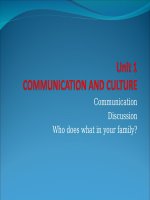Unit 01. Family Life. Lesson 7. Communication and Cuture
Bạn đang xem bản rút gọn của tài liệu. Xem và tải ngay bản đầy đủ của tài liệu tại đây (483.39 KB, 13 trang )
LE VAN THIEM HIGH SCHOOL
WELCOME TO OUR CLASS
Thursday, August 9th 2018
Designed by : Doan Thi Huong Thao
UNIT 1: FAMILY LIFE
LESSON 6: COMMUNICATION AND CULTURE
◦The section is divided into 2 subsections: Communication and
Culture.
◦In Communication subsection you can have an opportunity for further
and consolidation of the skills and the language about the household
chores learnt in the Unit.
◦In the Culture subsection you have learnt about the Singapore culture.
Through the reading you have got information about family life in
Singapore and have a chance to compare with the family life in
Vietnam.
I. COMMUNICATION
1. Discussion: Who does what in your family?
What is the person in each picture doing? Are they happy? Why? Or
Why not?
2. Listen to the TV talk show. Who said that?
◦In this task, you will find out who said what in the show.
◦How many people are there in the show?
◦And who are they?
◦ There are three people in the TV talk show.
◦ They are Mr. Pham Hoang, Mr. Nguyen Nam and Ms.
Mai Lan.
Read the statements (a-g) and underline the words or
phrases that you don’t understand.
◦1. household financial
burden:
◦2. homemaking
◦3: join hands
◦4: provider
◦5. neat:
◦Gánh nặng tài chính gia
đình
◦Làm việc nhà
◦Cùng chung tay
◦Người cung cấp
◦Gọn gàng, ngăn nắp
a. Women also work to share the
household financial burden with their
husband.
b. Homemaking can’t only be the job of
the wife.
c. A woman’s job is to look after
everybody in the family and take care of
the house.
d. Both husband and wife should join
hands to provide for the family nd to
make it happy.
e. In the family, the husband is the
provider.
f. Women’s roles have changed.
Mr. Pham Hoang
Ms. Mai Lan
Mr. Nguyen
Nam
c, e
a, f
b, d
Discussion
◦1. Whose opinion do you agree with?
◦2. What do you think the roles of the wife and the
husband should be? Give reason(s) for yours.
◦3. What roles do your mother and father perform in
your family?
◦4. Are your mother and father happy about their roles?
Why? Or Why not?
II. CULTURE
Read the two texts about family life in Singapore
and Vietnam the answer the questions
SINGAPORE
VIET NAM
◦In Singapore today, people tend to live in
nuclear families which consist of parents and
children. Families in Singapore are getting
smaller. Many children even grow up in
single- parent homes. In most Singaporean
families, both parents work. Very young
children go to nursery schools or stay at home
with a child- minder when their parents are at
work. Old people usually live in their homes
or a nursing home if they can not look after
themselves. Singaporean parents try spend
their free time collaborating with thee school
in educating their children through the
activities of the Parent Support Group or
Parent Teacher Association.
◦The extended family which consists of three
or even four generations- great grand parents,
grandparents, parents and children- is still
very popular in Viet Nam. In most Vietnamese
families, when both parents work, young
children stay at home and are looked after by
their grandparents or great-grandparents. On
the other hand, it is the duty of the young
people to take care of their elderly parents. A
person will be considered ungrateful if he/ she
does not take good care of his/ her parents or
grandparents. Vietnamese parents often spend
their free time helping their children with their
homework of giving them advice on behavior.
Look at some pictures about the daily familylife
in Singapore and Viet Nam
QUESTIONS
1. What type of family is
popular in the country?
2. Who take care of young
children when Their
parents are at work?
3. Who looks after elderly
parents?
4. How do the parents
contribute to the educating
their children?
IN SINGAPORE
IN VIETNAM
QUESTIONS
1. What type of family is
popular in the country?
2. Who take care of young
children when Their
parents are at work?
3. Who looks after elderly
parents?
4. How do the parents
contribute to the educating
their children?
IN SINGAPORE
Nuclear family
IN VIETNAM
Extended family
Nursery school or child- Grandparents or great
minder
grandparents
Nursing homes
Their children
They take part in the
activities of the Parent
Support Group or Parent
Teacher Association
They help their children
with their homework or
give them advice on
behavior









